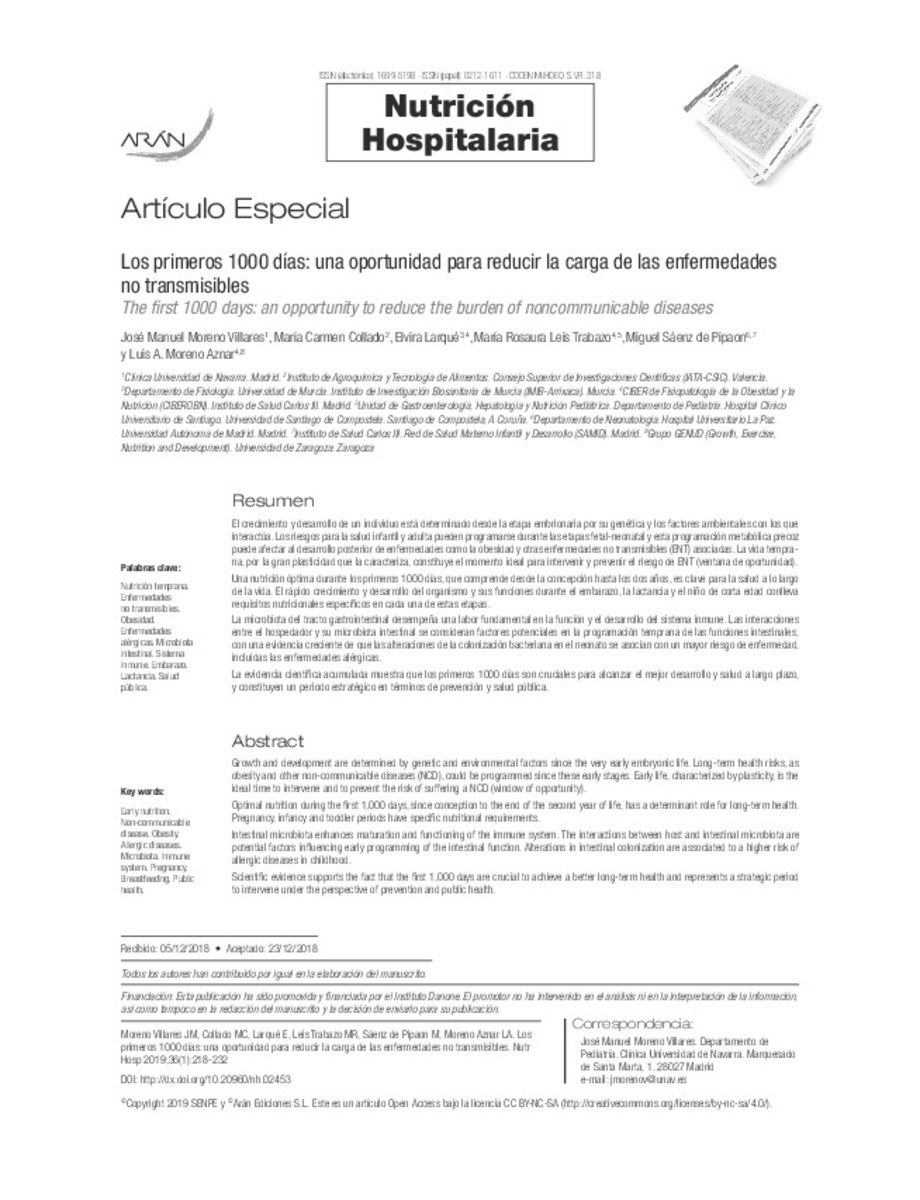Full metadata record
| DC Field | Value | Language |
|---|---|---|
| dc.creator | Moreno-Villares, J.M. (José Manuel) | - |
| dc.creator | Collado, M.C. (María Carmen) | - |
| dc.creator | Larqué, E. (Elvira) | - |
| dc.creator | Leis, R. (Rosaura) | - |
| dc.creator | Saenz-de-Pipaon, M. (Miguel) | - |
| dc.creator | Moreno, L.A. (Luis A.) | - |
| dc.date.accessioned | 2021-09-20T09:51:20Z | - |
| dc.date.available | 2021-09-20T09:51:20Z | - |
| dc.date.issued | 2019 | - |
| dc.identifier.citation | Moreno-Villares, J.M. (J.M.); Collado, M.C. (María Carmen); Larqué, E. (Elvira); et al. "Los primeros 1000 días: una oportunidad para reducir la carga de las enfermedades no transmisibles". Nutrición Hospitalaria. 36 (1), 2019, 218 - 232 | es |
| dc.identifier.issn | 0212-1611 | - |
| dc.identifier.other | PMID: 30836758 | - |
| dc.identifier.uri | https://hdl.handle.net/10171/62032 | - |
| dc.description.abstract | El crecimiento y desarrollo de un individuo está determinado desde la etapa embrionaria por su genética y los factores ambientales con los que interactúa. Los riesgos para la salud infantil y adulta pueden programarse durante las etapas fetal-neonatal y esta programación metabólica precoz puede afectar al desarrollo posterior de enfermedades como la obesidad y otras enfermedades no transmisibles (ENT) asociadas. La vida temprana, por la gran plasticidad que la caracteriza, constituye el momento ideal para intervenir y prevenir el riesgo de ENT (ventana de oportunidad). Una nutrición óptima durante los primeros 1000 días, que comprende desde la concepción hasta los dos años, es clave para la salud a lo largo de la vida. El rápido crecimiento y desarrollo del organismo y sus funciones durante el embarazo, la lactancia y el niño de corta edad conlleva requisitos nutricionales específicos en cada una de estas etapas. La microbiota del tracto gastrointestinal desempeña una labor fundamental en la función y el desarrollo del sistema inmune. Las interacciones entre el hospedador y su microbiota intestinal se consideran factores potenciales en la programación temprana de las funciones intestinales, con una evidencia creciente de que las alteraciones de la colonización bacteriana en el neonato se asocian con un mayor riesgo de enfermedad, incluidas las enfermedades alérgicas. La evidencia científica acumulada muestra que los primeros 1000 días son cruciales para alcanzar el mejor desarrollo y salud a largo plazo, y constituyen un periodo estratégico en términos de prevención y salud pública. | es_ES |
| dc.description.abstract | Growth and development are determined by genetic and environmental factors since the very early embryonic life. Long-term health risks, as obesity and other non-communicable diseases (NCD), could be programmed since these early stages. Early life, characterized by plasticity, is the ideal time to intervene and to prevent the risk of suffering a NCD (window of opportunity). Optimal nutrition during the first 1,000 days, since conception to the end of the second year of life, has a determinant role for long-term health. Pregnancy, infancy and toddler periods have specific nutritional requirements. Intestinal microbiota enhances maturation and functioning of the immune system. The interactions between host and intestinal microbiota are potential factors influencing early programming of the intestinal function. Alterations in intestinal colonization are associated to a higher risk of allergic diseases in childhood. Scientific evidence supports the fact that the first 1,000 days are crucial to achieve a better long-term health and represents a strategic period to intervene under the perspective of prevention and public health. | es_ES |
| dc.description.sponsorship | Esta publicación ha sido promovida y fi nanciada por el Instituto Danone | es_ES |
| dc.language.iso | spa | es_ES |
| dc.publisher | ARAN Ediciones | es_ES |
| dc.rights | info:eu-repo/semantics/openAccess | es_ES |
| dc.subject | Materias Investigacion::Ciencias de la Salud::Pediatría | es_ES |
| dc.subject | Nutrición temprana | es_ES |
| dc.subject | Enfermedades no transmisibles | es_ES |
| dc.subject | Obesidad | es_ES |
| dc.subject | Enfermedades alérgicas | es_ES |
| dc.subject | Microbiota intestinal | es_ES |
| dc.subject | Sistema inmune | es_ES |
| dc.subject | Embarazo | es_ES |
| dc.subject | Lactancia | es_ES |
| dc.subject | Salud pública | es_ES |
| dc.subject | Early nutrition | es_ES |
| dc.subject | Non-communicable disease | es_ES |
| dc.subject | Obesity | es_ES |
| dc.subject | Allergic diseases | es_ES |
| dc.subject | Microbiota | es_ES |
| dc.subject | Immune system | es_ES |
| dc.subject | Pregnancy | es_ES |
| dc.subject | Breastfeeding | es_ES |
| dc.subject | Public health | es_ES |
| dc.title | Los primeros 1000 días: una oportunidad para reducir la carga de las enfermedades no transmisibles | es_ES |
| dc.title.alternative | The first 1000 days: an opportunity to reduce the burden of noncommunicable diseases | es_ES |
| dc.type | info:eu-repo/semantics/article | es_ES |
| dc.description.note | Este es un artículo Open Access bajo la licencia CC BY-NC-SA (http://creativecommons.org/licenses/by-nc-sa/4.0/) | es_ES |
| dc.identifier.doi | 10.20960/nh.02453 | - |
| dadun.citation.endingPage | 232 | es_ES |
| dadun.citation.number | 1 | es_ES |
| dadun.citation.publicationName | Nutrición Hospitalaria | es_ES |
| dadun.citation.startingPage | 218 | es_ES |
| dadun.citation.volume | 36 | es_ES |
Files in This Item:
Statistics and impact
Items in Dadun are protected by copyright, with all rights reserved, unless otherwise indicated.






